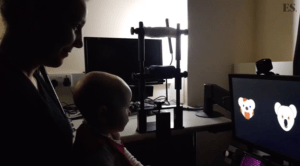“Happy Talk” is the first study in the InfantLab’s new eyetracking lab. We are looking at what makes Infant Directed Speech so attractive to babies.
What is Infant Directed Speech?
No matter the language or region of the world, people always tend to talk to babies in a slow and high-pitched tone, many times with a smile on our faces. It is second nature for us to change the way that we speak and the pronunciation our words when we are talking to babies rather than when we are talking to adults. Just go ahead and try talking to your baby the way you would normally, it’s hard isn’t it? This type of heightened toned and slowed speech is referred to as infant directed speech (IDS) as opposed to regular adult directed speech (ADS).

Past Research
A past study has shown that this is a consistent change mothers make to their voice when talking to their baby, no matter the language being spoken. This shows that IDS consistent across cultures and therefore must have some significant meaning to babies. The researchers believe the change in tone is a ‘cue mothers implicitly use to support babies’ language learning’. (Source). Past research has also shown that one month old and newborns both preferred the infant directed speech to the adult directed speech. The researchers state that this is most likely because of the exaggeration of the prosody, the stress and intonation in speech, of words (Source). This study looked at the preferences of babies under one month old, to see whether they favoured a character speaking in IDS or one speaking in ADS. The results of this study showed that newborn babies’ preference for the characteristics of IDS is present from birth, the researchers however do also consider the possibility of parents talking to their babies before birth playing a role in these results.
“Language but also emotion”
Another study looked at the importance of infant directed speech in babies’ language acquisition, the learning of new segments of language. This study specifically showed that the pitch and tone characteristics present in infant directed speech affect the way babies are able to tell the difference between different vowel sounds. The researchers concluded with this study that the exaggeration of pitch in IDS helps with vowel discrimination however the high pitch of IDS does not, instead aiding in emotional communication and gaining the baby’s attention. This shows how important IDS can be in babies learning of language as well as babies understanding of emotion (Source).
Our Current Study

A mother and baby taking part in the Happy Talk study
The baby will sit on their parents lap while two cartoons are placed on a screen, one that talks with IDS and one with ADS. Throughout the study we will track the baby’s eye movement to see which cartoon the baby favors, the IDS one or the ADS one. To accurately discern which the baby truly likes more we are using an eye-tracking technology to follow which cartoon the baby looks at longest. We will also be recording the study to see the overall reaction of the baby to both types of speech and see which they tend to prefer based on their body language and facial expressions.
Here is video from when the Evening Standard recently came to our lab to discuss this study and other research: https://www.standard.co.uk/news/health/the-latest-brainwave-octopus-hat-to-monitor-children-s-development-a4096381.html
Information to sign up
We are currently looking for more wonderful babies to participate in this study here at Goldsmiths InfantLab. If you and your baby are interested in participating please contact us at infantlab@gold.ac.uk or call 0207 717 2983 or register on our website https://sites.gold.ac.uk/infantlab/take-part/
Article by Megan Loftus, 17 April 2019
Leave a Reply